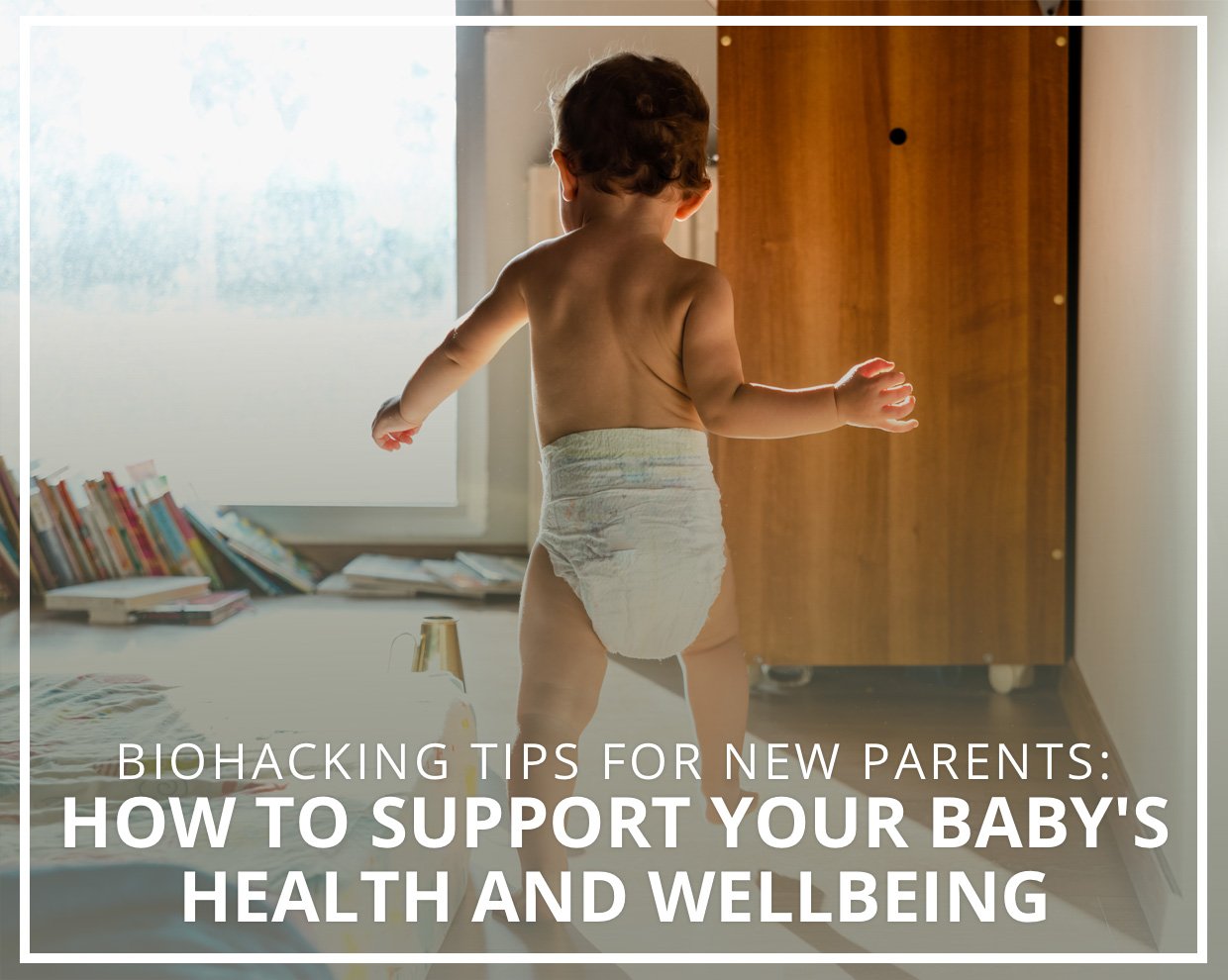New parenthood is exciting yet challenging. In today's world, parents face unique concerns that can be overwhelming. The pressure for mothers to ‘bounce back’ post-pregnancy and the demands of work and social life can divert attention from what matters most: your family's wellbeing. Biohacking offers innovative ways to promote optimal health, strength, and resilience for your baby. This health report guides new parents through biohacking using nutrient support and technology to create ideal conditions for their babies to thrive.
The environment
First, let's talk about the hurdles that may interfere with your baby's growth and development. Babies are sensitive to their external and internal environments due to their underdeveloped immune and nervous systems. [1] Their little bodies are still growing and adapting to the world around them, so they are more vulnerable to germs, loud noises, strong smells and bright lights. During the first few months of life, the baby's brain starts rapidly developing over 1 million new neural connections per second. [2] This is in response to the baby's experiences and interactions with their surroundings. During this time, the brain is especially receptive to sensory input, so they may have a harder time processing and responding to excessive sensory stimuli. This sensitivity is a natural part of their development, and caregivers need to provide a safe and supportive environment to help them thrive.
The home can be full of hidden toxins, suffer from poor air quality, and contain noise pollution that can create a less-than-ideal environment for your little one. [3] Making simple adjustments to your home can create a supportive environment by reducing your baby's exposure to these factors. Consider using natural cleaning products, improving ventilation, and using soft lighting to help reduce sensory stress for your baby.


Sleep
Parenthood can be exhausting, especially when your little one keeps waking up during the night. Babies require a significant amount of sleep to support their physical and cognitive development, with babies up to one year old needing 12 to 16 hours of sleep each day. [4] Interestingly, premature babies may spend around 90% of their day asleep. [5] To help ensure babies get the sleep they need, it's essential to create a conducive environment that is cool, dark, and quiet. Additionally, blue light from screens and light bulbs can disrupt melatonin production, making it difficult for babies to fall asleep. [6] To combat this, parents may consider using a blue light blocking bulb in the bedrooms and living areas (available in our UK store). Finally, establishing a consistent bedtime routine and using gentle sleep training methods that support self-soothing can also help babies develop healthy sleep habits. Remember, as a parent, it's important to take care of yourself, too; there's no shame in going for a nap when you have another set of helping hands. Also, having a bottle of Amata Life Sleep and Relax at your nightstand can help you manage your night-time disruption and lessen the morning grogginess (available in our UK store).


Immunity
The first few months of a baby's life are critical for their immune system development, as it sets the foundation for their overall health. Luckily, natural, raw food alternatives may help boost immunity in infants, such as Extra Virgin Cod Liver Oil. This oil is rich in essential vitamins A and D and omega-3 fatty acids docosahexaenoic acid DHA and eicosapentaenoic acid EPA, which can aid in healthy immune function for babies. [7] Not only does cod liver oil have anti-inflammatory properties that can help protect against infections and chronic diseases in the future, but studies also suggest that it can reduce the risk of respiratory infections [8] and other illnesses in infants. [9]
Please be aware fish is also a common allergen, so only introduce cod liver oil directly to your baby as approved by a doctor. A gentle and non-intrusive way to introduce cod liver oil to your baby is by applying the oil topically to the skin or having mothers consume the oil and pass on its nutrients through breast milk. This allows for the benefits of the oil to be received without discomfort or difficulty for the baby.
As a parent or caregiver, it's natural to want to protect your baby from harmful bacteria and germs. However, it's important to be cautious when it comes to the use of anti-bacterial soap and detergents. While these products can effectively kill germs, they also have the potential to eliminate beneficial bacteria that are necessary for a baby's immune system development. Overusing these products can also lead to the creation of antibiotic-resistant bacteria, which can pose a significant health risk. [10] A clean environment is essential, but opting for a gentle castile soap like Dr Bronner‘s instead of harsher alternatives is best. It's also important to avoid harsh chemicals and fragrances that irritate a baby's delicate skin and potentially upset their sensitivities. Doing so can help prevent skin irritation and promote a healthy environment for your baby.


Brain health
The brain is the most complex organ in the human body and, during the first years of life, it undergoes an incredible amount of growth and development that will go on to determine a child's future. Proper nutrition plays a vital role in promoting healthy infant brain development, making Extra Virgin Cod Liver Oil an excellent source of omega-3 fatty acids for optimal brain function and development. Scientific studies have shown that omega-3 DHA fatty acids can improve cognitive function in babies. [11] Studies at 5 years of age show early consumption of fatty acids is essential to the growth and development of the brain and nervous system and intelligence. [12] The anti-inflammatory properties of cod liver oil can also protect the brain from damage and promote healthy growth.


Digestion
The gut microbiome is a complex community of microorganisms that live in the digestive tract. It's like a bustling city inside your baby's tummy, complete with its own little community of microorganisms. And just like a real city, the gut microbiome is constantly evolving and adapting to its environment.
At birth, a baby's gut is relatively sterile, but as they pass through the birth canal and are exposed to the environment, they acquire bacteria from their mother and the surrounding environment. [13] Breast milk is like a secret weapon in the battle for a healthy gut, as it contains helpful bacteria that can boost your baby's gut and establish and maintain a healthy balance of microorganisms. As the young gut biome of a baby is still developing during the first few years of life, it's important to establish microbial diversity where possible. This is where probiotics can help.
Probiotics are living microorganisms that provide health-giving properties when consumed in adequate amounts. [14] They can be especially important for infants born via C-section (who missed out on the beneficial bacteria they would have received while passing through the birth canal), and formula-fed babies (who may not receive the same beneficial bacteria found in breast milk). Smidge® Infant Probiotic Powder is specially formulated for your baby's developing digestive system. The clinically-proven probiotic strains are naturally present in healthy infants and help to colonise baby’s intestines with beneficial bacteria from the start. [15] [16] [17] [18] A baby’s delicate biome balance can sometimes be thrown off by changes in diet, illness, or antibiotics. So, having a bottle of Smidge® Infant Probiotic Powder can go a long way to managing cases of constipation, colic, and diarrhoea!


Teeth
Baby teeth are a special milestone in a child's development, but their gums and oral biome play an equally important role in their dental health. Initially, a baby's mouth is relatively sterile (like the gut), but as they explore and feed, they acquire bacteria and other microorganisms from their surroundings. [19] Dr Hisham's - Baby Teeth Serum is a unique and gentle product that helps support the development of a healthy oral microbiome. This serum is a dentist-approved prebiotic recipe formulated with a blend of natural ingredients that are gentle and safe for babies. Use it after each feed to freshen the baby's mouth or help soothe and nourish the baby's gums. The serum promotes a healthy environment for teeth growth and is easy to apply via its pump applicator. Establishing wholesome routines early can prepare your child for a lifetime of healthy teeth and oral health.
In conclusion, new parents face unique challenges in today's modern age, and it can be challenging to focus on balancing your work, responsibilities, relationships, health and wellbeing. Biohacking provides new parents with practical tips and advice on creating the ideal conditions for their babies to thrive. From reducing exposure to toxins and providing a conducive sleep environment, to boosting immunity and promoting healthy brain development, biohacking can help new parents overcome the hurdles of parenthood and support a robust, resilient, and healthy baby.
References
[1] Autonomic nervous system development and its’ impact on neuropsychiatric outcome.
[2] InBrief: the science of early childhood development.
[3] Childhood ingestions of environmental toxins: what are the risks?
[4] Recommended amount of sleep for pediatric populations: A consensus statement of the american academy of sleep medicine.
[5] Centers for Disease Control and Prevention. Infant mortality.
[6] Blue light impact on children (PDF)
[7] Prenatal docosahexaenoic acid supplementation and infant morbidity: randomized controlled trial.
[8] Cod liver oil, young children, and upper respiratory tract infections.
[9] Use of cod liver oil during the first year of life is associated with lower risk of childhood-onset type 1 diabetes: a large, population-based, case-control study.
[10] Antibacterial household products: cause for concern.
[11] Role of long-chain polyunsaturated fatty acids in the first year of life.
[12] Neonatal docosahexaenoic acid in preterm infants and intelligence at 5 years.
[13] The role of microbiota in infant health: from early life to adulthood.
[14] Early probiotic supplementation with B. infantis in breastfed infants leads to persistent colonization at 1 year.
[15] Why are bifidobacteria important for infants?
[16] In vitro immunomodulatory activity of Lactobacillus fermentum CECT5716 and Lactobacillus salivarius CECT5713: two probiotic strains isolated from human breast milk.
[17] Prevention of recurrent acute otitis media in children through the use of lactobacillus salivarius PS7, a target-specific probiotic strain.
[18] Applications and safety considerations of Lactobacillus salivarius as a probiotic in animal and human health.
[19] Exploring the maternal and infant oral microbiomes - a pilot study.

 AU Store
AU Store  UK Store
UK Store NZ Store
NZ Store EU Store
EU Store









